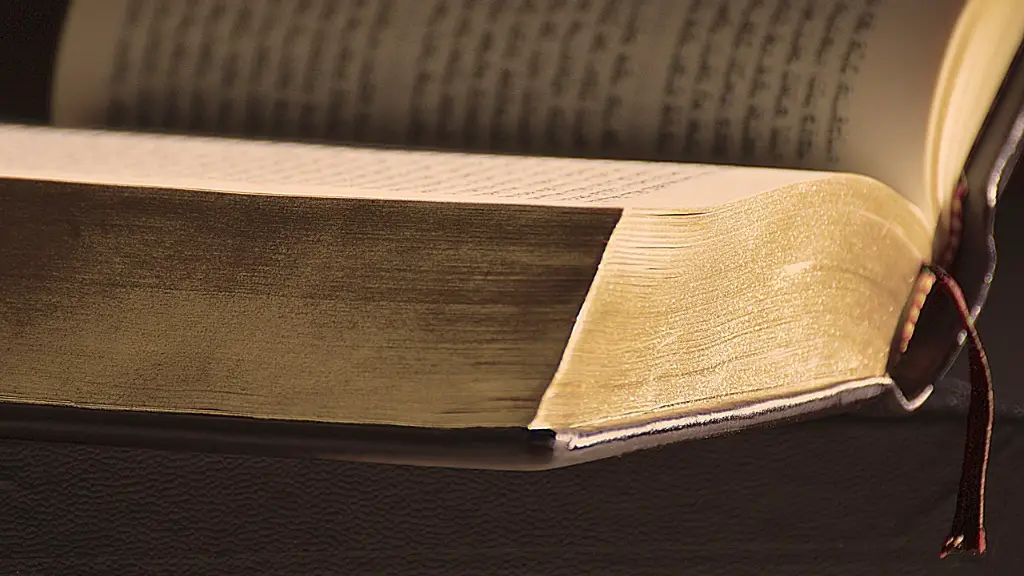Elijah the prophet is one of the most important figures in the Bible. His influence has been profound and has been felt throughout the Christian and Jewish faiths. The Elijah story holds a special place in the history of religions, as well as in the Old Testament. This article examines his role in the Bible, his significance to the faith, and discusses some of the interpretations of his work.
The Bible mentions Elijah more than 40 times, making him one of the best-known figures in the Bible. His story begins in 1 Kings 17 when the prophet Elijah announces a drought, and God commands him to hide by the brook of Cherith. From this moment on, Elijah’s ministry takes off and leads him through many dramatic adventures.
In his travels, Elijah meets a widow and her son, shows God’s power by calling down fire from heaven, and, ultimately, mortally wounds forces sent by the king Ahab. Later, Elijah encounters the prophet Elisha, who eventually takes up his mantle. The climax of Elijah’s ministry comes in 2 Kings when he ascends to heaven in a whirlwind.
Both Christian and Jewish traditions view Elijah as an important religious figure. Jews consider Elijah to be one of the most powerful prophets, and Orthodox Judaism holds that Elijah visits each household that celebrates the Passover seder. For Christians, Elijah is a saint and a protector, and his ascension is seen as a symbol of the divine power of God.
Scholars have long debated Elijah’s significance and have offered a range of interpretations. Some have argued that Elijah is a symbol of God’s power and that his travels represent the testing of faith. Others have viewed him as a prototype for the Messiah and have argued that his ascension sets up his eventual return. Still others have viewed him as a symbol of perseverance, arguing that his struggles embody the struggles of other people against oppressive authority.
Whatever the interpretation, Elijah’s role in the Bible is indisputable. He is one of the best-known figures in Biblical history and holds a special place in both Christian and Jewish traditions. The story of Elijah is one that is both inspiring and thought-provoking, and one that will continue to influence faith and culture for generations.
Role in the New Testament
Despite Elijah’s importance in the Old Testament, his role in the New Testament is more limited. He is mentioned once in the Gospel of Mark and once in the Gospel of Matthew, both times in relation to John the Baptist. In Mark, John is described as coming “in the spirit and power of Elijah,” while in Matthew, he is described as being sent “to prepare the way of the Lord.”
The New Testament takes a largely spiritual view of Elijah. Some Christians view Elijah as a forerunner of Jesus and the Messiah, while others view him as a figure of faith who was used by God to accomplish His will. Instead of focusing on Elijah’s physical feats, the New Testament emphasizes his moral and spiritual accomplishments.
In the New Testament, Elijah is used as a symbol of hope and faith in a time of great suffering. He is remembered for his fortitude and faith, and his story acts as an inspiration for Christians to endure their trials and remain faithful in the face of hardship.
The New Testament’s view of Elijah reinforces the importance of his ministry and provides insights into divine providence. His ascension in the whirlwind symbolizes the “heavenly realm” of which he is a part and serves as a reminder of the ultimate futility of human suffering and struggle.
Legacy and Significance
Although Elijah’s role in Biblical history is undeniable, his legacy and significance remain subject to debate. No matter the interpretation, his story is both inspiring and thought-provoking, and his presence in both the Old and New Testaments is evidence of his importance in religious tradition.
Various Christian denominations consider Elijah to be a source of inspiration and guidance. He is seen as a symbol of faith, fortitude, and perseverance, and he is often invoked as a reminder of God’s power and divine grace.
Elijah is also viewed by some as a messenger of God and an intercessor between God and mankind. His willingness to stand up for God’s people in a time of suffering and oppression has inspired generations of people to do the same. He is seen as a model of faith and courage and a reminder of God’s love and justice.
Elijah has left a lasting legacy on both Christians and Jews. His willingness to face adversity and remain faithful to God has resonated throughout the ages and continues to influence religious, cultural, and political thought today. In short, his story continues to inspire and challenges believers, both now and in the future.
Customary Practices
Elijah is so important to both Christian and Jewish faiths that he has come to be associated with a variety of customs and traditions. In Jewish culture, for example, parents often light a candle in Elijah’s memory on the first day of Passover. This candle is believed to symbolize Elijah’s presence in the home and his protection from harm.
In Christian culture, it is customary to hold an Elijah Cup at special occasions such as Baptisms, Confirmations, and Weddings. The cup is filled with wine and placed in the center of the table. In some denominations, the cup is believed to symbolize Elijah’s spirit in the room and his presence at the event.
Elijah is also a popular subject in art. From classical paintings to modern-day art books, Elijah’s story has inspired countless artists throughout history. In more recent times, Elijah has also been the subject of a number of films and plays.
Elijah is clearly an important figure in the Bible and in religious culture. His role in the Bible is indisputable, and his influence is still felt today. His story and legacy will continue to influence faith and culture for generations to come.
Meaning of Name
Though the name “Elijah” remains shrouded in mystery, scholars have offered a modified interpretation of what it could mean. Most agree that the name “Elijah” is derived from two Hebrew words: “El” (meaning “God”) and “Yah” (meaning “Lord”). It is thus theorized that “Elijah” could be roughly translated as “God is the Lord” or “The Lord is my God”.
Another popular interpretation is that “Elijah” is a shortened form of the Hebrew given name “Eliyahu”, which is composed of three elements: “Eli” (meaning “my God”), “Yah” (“Lord”), and “Hu” (“he”). This could thus be interpreted as “My God is the Lord” or “The Lord is my God”.
Regardless of its exact meaning, the name “Elijah” carries immense significance in both Jewish and Christian traditions. It is a reminder of God’s power and His willingness to intervene in the lives of His people. It also serves as a reminder of the importance of faith, courage, and steadfastness in adversity.
Parallels in Other Faith Traditions
Though Elijah’s presence is largely reserved for major faith traditions such as Christianity and Judaism, he has also been accepted by followers of other faiths. In Islam, for example, Elijah is seen as a prophet sent by Allah to call the people of Israel to repentance and to challenge their idolatry. He is mentioned in the Quran, though his role is more limited than in Christianity or Judaism.
In Sikhism, too, Elijah is seen as an individual of great significance. Sikh scripture mentions him several times, and Sikh tradition holds that the third Guru, Guru Amar Das, was a direct descendant of Elijah. Thus, Elijah is seen as the link between Sikhism and the prophetic tradition of Judaism.
In Hinduism, too, Elijah holds a special place of respect. The Rig Veda, India’s most sacred scripture, describes him as a prophet who visited India and confronted the local rulers. He is described in glowing terms and is held in high regard in the Hindu tradition.
Though Elijah is a major figure in several major faith traditions, his influence is felt in many others, too. His life, ministry, and message have profoundly shaped the development of religious thought in the East and West. His legacy will continue to be felt for generations to come.
Elijah in Popular Culture
Elijah’s presence can also be seen in popular culture. One of the most famous examples is the Elijah cycle, a series of literature and folklore about the prophet in both Christian and Jewish traditions. This cycle is composed of several stories and serves as a reminder of the significance of Elijah’s ministry in the Bible.
Elijah is also the subject of many films, plays, and other works of art. He is a fixture in art books and is often depicted in paintings and other forms of artwork. Because of his unique presence in both Old and New Testament literature, his story is particularly suited to being depicted in both visual and literary forms.
Musically, Elijah is the subject of many popular works, ranging from classical music to folk songs. His story has been used to inspire musical compositions and often serves as a reminder of the power of faith and the importance of trusting in divine providence.
Elijah is not only one of the major figures in the Bible, but is also a significant figure in popular culture. His influence is felt in literature, art, film, music, and other forms of media, and his story continues to inspire people all over the world.





